#lesbian feminism
Text
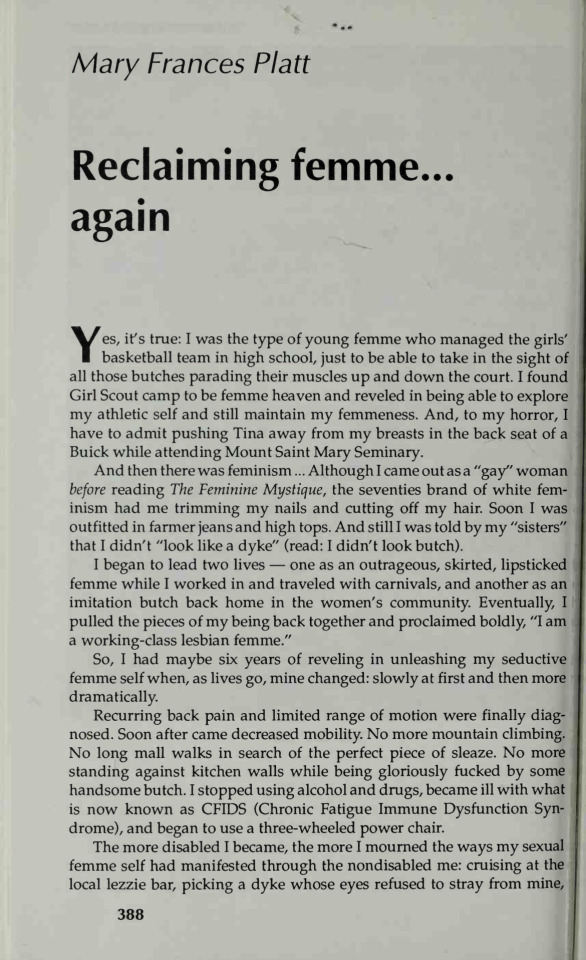

"Yes, it's true: I was the type of young femme who managed the girls basketball team in high school, just to be able to take in the sight of all those butches parading their muscles up and down the court. I found Girl Scout camp to be femme heaven and reveled in being able to explore my athletic self and still maintain my femmeness. And, to my horror, I have to admit pushing Tina away from my breasts in the back seat of a Buick while attending Mount Saint Mary Seminary.
And then there was feminism... Although I came out as a "gay" woman before reading The Feminine Mystique, the seventies brand of white feminism had me trimming my nails and cutting off my hair. Soon I was outfitted in farmer jeans and high tops. And still I was told by my "sisters" that I didn't "look like a dyke" (read: I didn't look butch).
I began to lead two lives- one as an outrageous, skirted, lipsticked femme while I worked in and traveled with carnivals, and another as an imitation butch back home in the women's community. Eventually, I pulled the pieces of my being back together and proclaimed boldly, "I am a working-class lesbian femme."
So I had maybe six years reveling in unleashing my seductive femme self when, as lives go, mine changed: slowly at first and then more dramatically.
Recurring back pain and limited range of mobility were finally diagnosed. Soon after came decreased mobility. No more mountain climbing. No long mall walks in search of the perfect piece of sleaze. No more standing against kitchen walls being gloriously fucked by some handsome butch. I stopped using alcohol and drugs, became ill with what is now known as CFIDS (Chronic Fatigue Immune Dysfunction Syndrome), and began to use a three-wheeled power chair.
The more disabled I became, the more I mourned the ways my sexual femme self had manifested through the nondisabled me: cruising at the local lezzie bar, picking up a dyke whose eyes refuse to stray from mine, dancing seductively, moving all of me for all of her. Cooking: love and suggestion neatly tucked into the folds of a broccoli quiche. Serving my date in varying, sleazy clothing, removing layers as the meal and our passion progressed. And making love... feeling only pleasure as my hips rose and fell under the weight of her. Accomplishment and pride smirked across my face as her wrists finally submitted to the pressure of strong persistent hands. There are the ways I knew to be femme, to be the essence of me.
It's been five years now since I began using my wheelchair. I am just awakening to a new reclamation of femme. Yes. I still grieve the way I was, am still often unsure how this femme with disabilities will act out her seduction scenes. I still marvel when women find passion amidst the chrome and rubber that is now a part of me.
There have been numerous dates, lovers, relationships, sexual partners, and fliterations along the way. Cindy, Jenny, Ellie, Emma, Diane, Dorothy, Gail, June, Clove, Lenny, Cherry, Diana, Sarah I, and Sarah II. You have all reminded me in your own subtle or overt, quit or wild ways that I am desirable, passionate, exciting, wanted.
Yes I am an incredibly sexual being. An outrageous, loud mouthed femme who's learning to dress, dance, cook, and seduce on wheels; finding new ways to be gloriously fucked by handsome butches and aggressive femmes. I hang out with more sexual outlaws now- you know, the motorcycle lesbians who see wheels and chrome between your legs as something exciting, the leather women whose vision of passion and sexuality doesn't exclude fat, disabled me.
Ableism tells us that lesbians with disability are asexual. (When was the last time you dated a dyke who uses a wheelchair?) Fat oppression insists that thin is in and round is repulsive. At times, these voices become very loud, and my femme, she hid quietly amidts the lists.
Now my femme is rising again. The time of doubt, fear, and retreat has passed. I have found my way out of the lies and oppression and have moved into a space of loving and honoring the new femme who has emerged. This lesbian femme with disabilities is wise, wild, wet, and wanting. Watch out.
-"Reclaiming femme... Yet again" Mary Francis Platt, The Persistent Desire (Edited by Joan Nestle) (1992)
#lesbian#lesbianism#lesbian history#disabled lesbian#lgbt history#gay history#butch femme#femme lesbian#feminism#lesbian feminism#the persistent desire#intersectionality#disability history#disability rights
2K notes
·
View notes
Text
Serena Nanda is an Orientalist lunatic who hates trans women.
The intro to the first edition of her book was written by John Money.
She repeatedly talks about hijras describing themselves as women, and ignoring them to call them castrated males and crossdressers.
Third-Sexing is anthropological transmisogynistic violence on a discipline level.
#transfeminism#gender is a regime#sex is a social construct#feminism#orientalism#transmisogyny#desiblr#desi tumblr#social constructionism#third sexing#materialist feminism#lesbian feminism#anthropology#anthro#academics#dark academia#transphobia#transphobes
136 notes
·
View notes
Text
Hearing other women talk vaguely about how things “used to be bad for women” saddens me. Things were really bad for women in [INSERT TIME PERIOD HERE]. (Not now though.) There’s always a sense of distance and indifference. An impersonality, an underlying sigh of relief, “Not that bad, could be worse.” I think this is a result of disconnection from each other and our histories. And I don’t think it’s totally our faults.
In my experience going to school in the USAmerican Midwest, I was taught the barest bones of women’s history. It was totally impersonal, cold, not engaging for me at all. We pretty much solely focused on legislature, and that did not thrill me. (Did you know Jane Addams had intimate relationships with women?) But then I started doing “independent study” (reading lesbian feminist writing) once I graduated high school and it was like my brain was exploding. I’m reading The Dialectic of Sex and I still feel that way. I just can’t get enough.
As a result of reading what I’ve read, I feel a stronger connection with women who are different from me because it turns out we have a lot in common. I feel less inclined to say things like “Women had it bad back in the day, but things are better now,” because I know not that much has actually changed, and the concrete changes that have been made are new and fragile. (Women in America only had a constitutional right to abortion for fifty years.)
I think if more women read books like Backlash by Susan Faludi, Loving to Survive by Dee LR Graham, and A Passion for Friends by Janice Raymond, we will have a wider perspective and a better shared understanding of our situation and position in our societies. I also think a lot of women would feel less crazy and alone upon reading women’s accounts of our own lives, what we synthesize from our experiences and observations, and how we can do things differently. That’s the effect feminist work had (and continues to have) on me.
You likely won’t find these books at a bookstore—at least that’s the case where I live—but you can find them online. I use ThriftBooks and Better World Books, and I’ve never received a damaged or illegible copy of a single book I’ve ever ordered, even though they’re super cheap, usually under $10 for a book. (They sometimes have highlighter marks or notes written in the margins, but I like seeing what the previous owner had to say, and I like to write in them too.) Finding and reading these books is well worth the effort. Talking about them and sharing them with other women is well worth the effort, too. I’d like to encourage every woman to get in touch with her intellectual legacy.
#mine#feminism#feminist#radical feminism#lesbian feminism#shulamith firestone#dee lr graham#janice raymond#susan faludi#booklr#bookblr
238 notes
·
View notes
Text
Can you imagine if a white lesbian public figure brutally murdered two trans women in an interracial relationship and their black son? The headlines, the think-pieces, op-eds...we would never hear the end of it. It would be blamed on lesbian communities as a whole and the transmisogyny and white supremacy we obviously perpetuate on a daily basis just by existing. Cotton ceiling discourse would be back with a vengeance. There would be rallies and vigils, there would be calls to "Stand by your trans", there would be "#LWithTheT" marches. There would be a community in mourning, full of fury and hurt and self-righteous rage at the nasty lesbian aggressors who clearly caused this anti-trans hate crime. There would be no room for nuance and all lesbians would be painted with the "evil cis white dykes want us dead" brush. All of this would be seen as a completely acceptable and understandable response to a brutal act of anti-trans violence by a lesbian perpetrator.
So where is the noise? Where is the clamouring? Where is the sound and fury, when a famous white trans activist murders an interracial lesbian couple and their black son? I don't expect (or want) it to spark a radfem revolution, but why is the silence around the Dana Rivers murder case so deafening? Why does no one in the so-called LGBTQ+ community care enough to loudly and proudly mourn and celebrate these women and their son? Charlotte, Patricia and Benny deserve to be remembered. They deserve our sound and fury. Even if it's difficult, even if the optics don't suit your world views, we cannot ignore some injustices and claim to fight against others. The cowardly LGBT+ media organisations and charities covering their eyes and pretending that this act of violence never happened, they will happily call on lesbians for solidarity this pride month, despite showing no solidarity for a lesbian family slaughtered by an apparent member of our own "community". How can we call this anything other than a cover-up, or at the very least, deliberate and contrived ignorance?
Patricia Wright. Charlotte Reed. Benny Toto Diambu-Wright. Their lives were stolen from them on November 11th 2016. I can find no obituarities, and minimal mainstream media coverage of their murders. For many years, it felt almost as if their suffering had been forgotten. It has taken six and a half years for their murderer to be convicted and sentenced to life without parole, a sentence which Rivers will spend in a women's prison. Is this justice, or a pale imitation of such? Either way, I hope this family may finally rest in peace and power, and that their loved ones may begin to move forwards.
Pat and Char, as they were known to friends and family, are survived by two children. Patricia worked as a school teacher and deaf interpreter for schools, while Charlotte worked in a salon known locally for being trans-inclusive. Patricia was also an artist and talented actor, having considered a career in performing arts after high school. Charlotte had previously been a member of an all-female motorcycle club, which Rivers was also involved in. Both Charlotte and Patricia were also former regular attendees of MichFest, a feminist music festival which was closed down in 2015, following years of protests by trans women including Dana Rivers. 19-year-old Benny had just graduated high school and, according to his brother, hoped to become a nurse.
A victim impact statement was read out by Richard Wright, Patricia's younger brother, during Rivers' sentencing. I can't find the full text but much of the statement can be found in the Berkeley Scanner article below. Wright describes the impact of finding out that his sister and her family had been "assassinated in their own home" and the traumatising experience of searching for important paperwork at the bloodied crime scene that was once their home. According to Richard, Dana Rivers "chose her [sic] entitlement and narcissism over basic human decency" and "chose violence, cruelty, sadism and entitlement — over and over and over again." This is in reference to the length of court proceedings due to Rivers' changing pleas, as well as the brutality of the crime itself, which was carried out using guns, knives and arson. According to the judge, the murders of Patricia, Charlotte and Benny were "the most depraved crime that I’ve handled in the criminal justice field in 33 years."
No one but Rivers is responsible for these heinous crime, but all of us are responsible for ensuring history is not forgotten, and that the stories of those taken from us continue to be told. And when we tell their stories, in sound and in fury, we must ensure they do not fall on deaf ears.
"They were real people, not collateral damage...They deserve to be seen."
- Richard Wright's victim impact statement
For more information, see below:
321 notes
·
View notes
Text
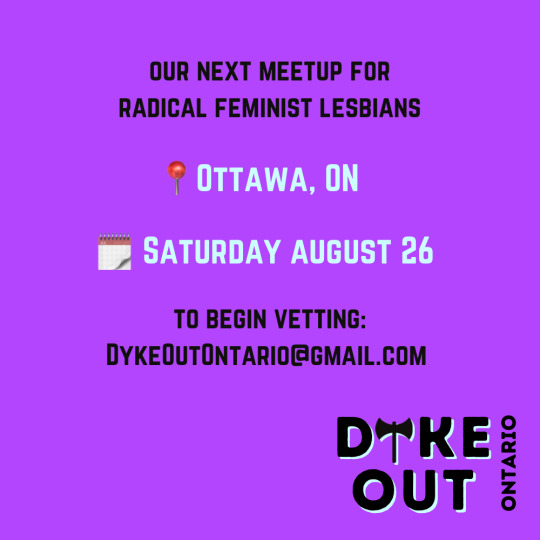

#radfem#radical feminist#ecofeminism#ecofeminist#lesfem#lesbian feminism#lesbian feminist#lesbian seperatist#6B4T#female separatism#radfems do touch#radfems please interact#terfsafe#terfs do interact#terfs do touch#terf lesbian#terfs please interact#terfblr#radblr#radfem Canada#radfem Ontario#terf Canada#terf Ontario#lesfem Canada#lesfem Ontario#lesbian not queer#lesbian seperatism#radical lesbian#lesbian separatism#lesbian radfem
182 notes
·
View notes
Text
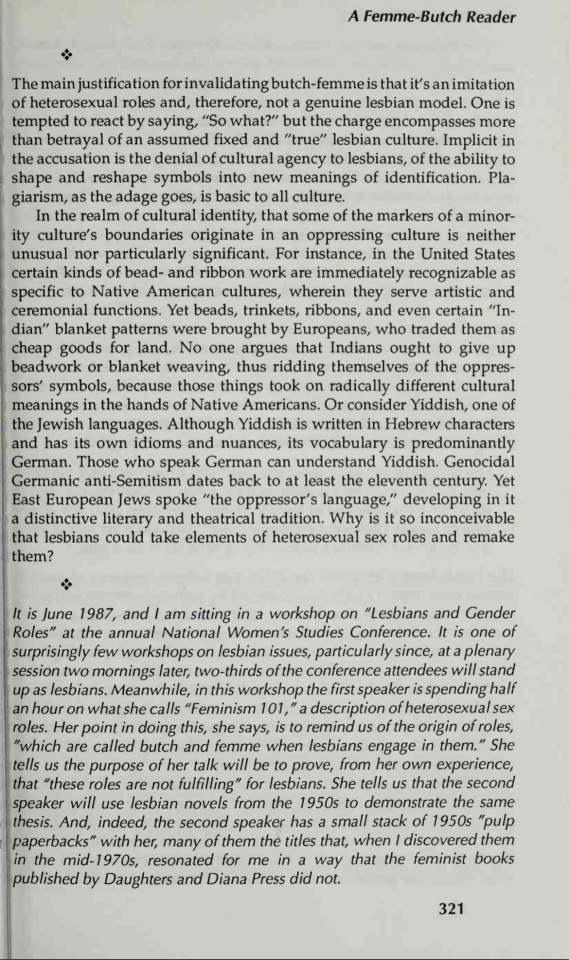
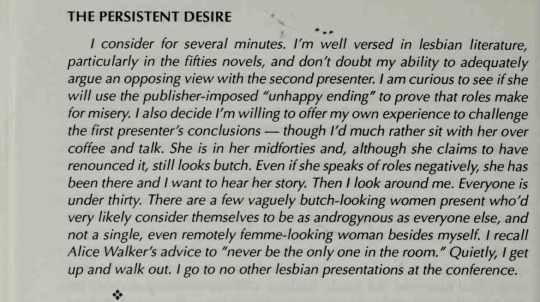
"The main justification for invalidating butch-femme is that its an imitation of heterosexual roles and, therefore, not a genuine lesbian model. One is tempted to react by saying "So what?" but the charge encompasses more than betrayal of an assumed fixed and "true" lesbian culture. Implicit in the accusation is the denial of cultural agency to lesbians, of the ability to shape and reshape symbols into new meanings of identification. Plagiarism, as the adage goes, is basic to all culture.
In the real of cultural identity, that some of the markers of a minority culture's boundaries originate in an oppressing culture is neither unusual nor particularly significant. For instance, in the United States certain kind of bead- and ribbon work are immediately recogniziable as specific to Native American cultures, wherein they serve artistic and ceremonial functions. Yet beads, trinkets, ribbons, and even certain "indian" blanket patterns were brought by Europeans, who traded them as cheap goods for land. No one argues that Indians out to give up beadwork or blanket weaving, thus ridding themselves of the oppressors symbols, because those things took on a radically different cultural meaning in the hands of Native Americans. Or consider Yiddish, one of the jewish languages. Although Yiddish is written in Hebrew characters and has its own idioms and nuances, its vocabulary is predominantly German. Those who speak German can understand Yiddish. Genocidal Germanic anti-Semitism dates back to at least the eleventh century. Yet East European Jews spoke "the oppressors language," developing in it a distinctive literary and theatrical tradition. Why is it so inconceivable that lesbians could take elements of heterosexual sex roles and remake them?
*
It is June 1987, and I am sitting in a workshop on "Lesbians and Gender Roles" at the annual National Women's Studies Conference. It is one of surprisingly few workshops on lesbian issues, particularly since, at a plenary session two mornings later, two thirds of the conference attendees will stand up as lesbians. Meanwhile, in this workshop the first speaker is spending half an hour on what she calls "Feminism 101," a description of heterosexual sex roles. Her point in doing this, she says, is to remind us of the origin of roles, "which are called butch and femme when lesbians engage in them." She tells us the purpose of her talk will be to prove, from her own experience, that "these roles are not fulfilling" for lesbians. She tells us that the second speaker will use lesbian novels from the 1950s to demonstrate the same thesis. And, indeed, the second speaker has a small stack of 1950s "pulp paperbacks" with her, many of them the titles that, when I discovered them in the mind-1970s, resonated for me in a way that the feminist books published by Daughters and Diana Press did not.
I consider for several minutes. I'm well versed in lesbian literature, particularly in the fifties novels, and don't doubt my ability to adequately argue an opposing view with the second presenter. I am curious to see if she will use the publisher-imposed "unhappy ending" to prove that roles make for misery. I also decide I'm willing to offer my own experience to challenge the first presenters conclusions- though I'd much rather sit with her over coffee and talk. She is in her midforties and, although she claims to have renounced it, still looks butch. Even if she speaks of roles negatively, she has been there and I want to hear her story. Then I look around me. Everyone is under thirty. There are a few vaguely butch-looking women present who'd very likely consider themselves to be as androgynous as everyone else, and not a single, even remotely femme-looking women besides myself. I recall Alice Walker's advice to "never be the only one in the room." Quietly, I get up and walk out. I go to no other lesbian presentations at the conference."
“Recollecting History, Renaming Lives: Femme Stigma and the feminist seventies and eighties" by Lyndall MacCowan, The Persistent Desire, (edited by Joan Nestle) (1992)
#the persistent desire#Lyndall MacCowan#Joan nestle#lesbian#lesbianism#butch and femme#butchfemme#butch and femme history#butch lesbian#femme lesbian#butch history#femme history#lesbian history#lesbian culture#lesbian feminism#lesbian feminist history#lgbt history#queer history
89 notes
·
View notes
Text
While I'm still focusing on finishing my book and my essay series on understanding TERFs, I wrote a quick, bite-sized post on one of the most common gender-conservative temper-tantrums expressed as a pithy three-word shibboleth. We take a harsh look at the motivations and assumptions underlying this mindset, and what people really mean when they assert "sex is real" as an antagonistic principle to transsexual existence.
#transfeminism#materialist feminism#social constructionism#sex is a social construct#gender is a regime#heterosexuality is a regime#substack#blog#lesbian feminism#feminism#gender critical#conservatism#transphobia#transmisogyny#anti transmasculinity#transgender#trans hrt#gender ideology#political ideology
116 notes
·
View notes
Note
I love seeing lesbian feminists on my dash !! I'd luv to be friends btw if that's ok...!!
So glad you like seeing me!! And yes I'd love to be friends, just dm me idm !! (this is an open invitation for pretty much anyone that wants to dm me)
But also I don't consider myself a lesbian feminist. I am a lesbian, and I am a feminist, but I am those things seperately. OP I'm sure you didn't realise but lesbian feminism is a completely different thing where one believes something along the lines of "the logical product of feminism includes choosing to be a lesbian" which isn't something I agree with bc attraction to men isn't inherently sexist and being a lesbian isn't a choice
Nothing against you OP and I'm sure it's an honest mistake tonnes of people have made, but I think it's worth correcting jsyk the difference between lesbians who are feminists and lesbian feminists
16 notes
·
View notes
Text
Why are 87% of women exclusively attracted to men, but 60% of male-bodied, male-raised, female-identifying "trans women" are attracted to women?


Also if 0.25% of the human population are lesbians*, and roughly 0.15% of society are sapphic trans goddesses**, then the lesbian community has no hope of shutting out straight males who want to steal our spaces.
Because the way I understand it, in a room of 100 lesbians, if using any definition of lesbian which includes the straight/bi men who call themselves lesbians, we have a breakdown of:
62-63 female lesbians (62.5%)
37-38 male lesbians (37.5%)
I.e. if a lesbian is defined without using biological sex, over a third of all lesbians are trans women. But clearly lesbians are overreacting to this tiny minority of people.
*if lesbians are 0.5% of all women, and women are roughly 50% of all people.
**if trans people are 0.5% of all society, and roughly 50% of all trans people are AMAB, ignoring non-binary people because we're grown-ups.
#lesbian#lesbian feminism#radfem safe#radical feminism#in need of maths help from super sexy statisticians#bc this is probably all wrong#but my point still fucking stands lol#gender critical
554 notes
·
View notes
Text
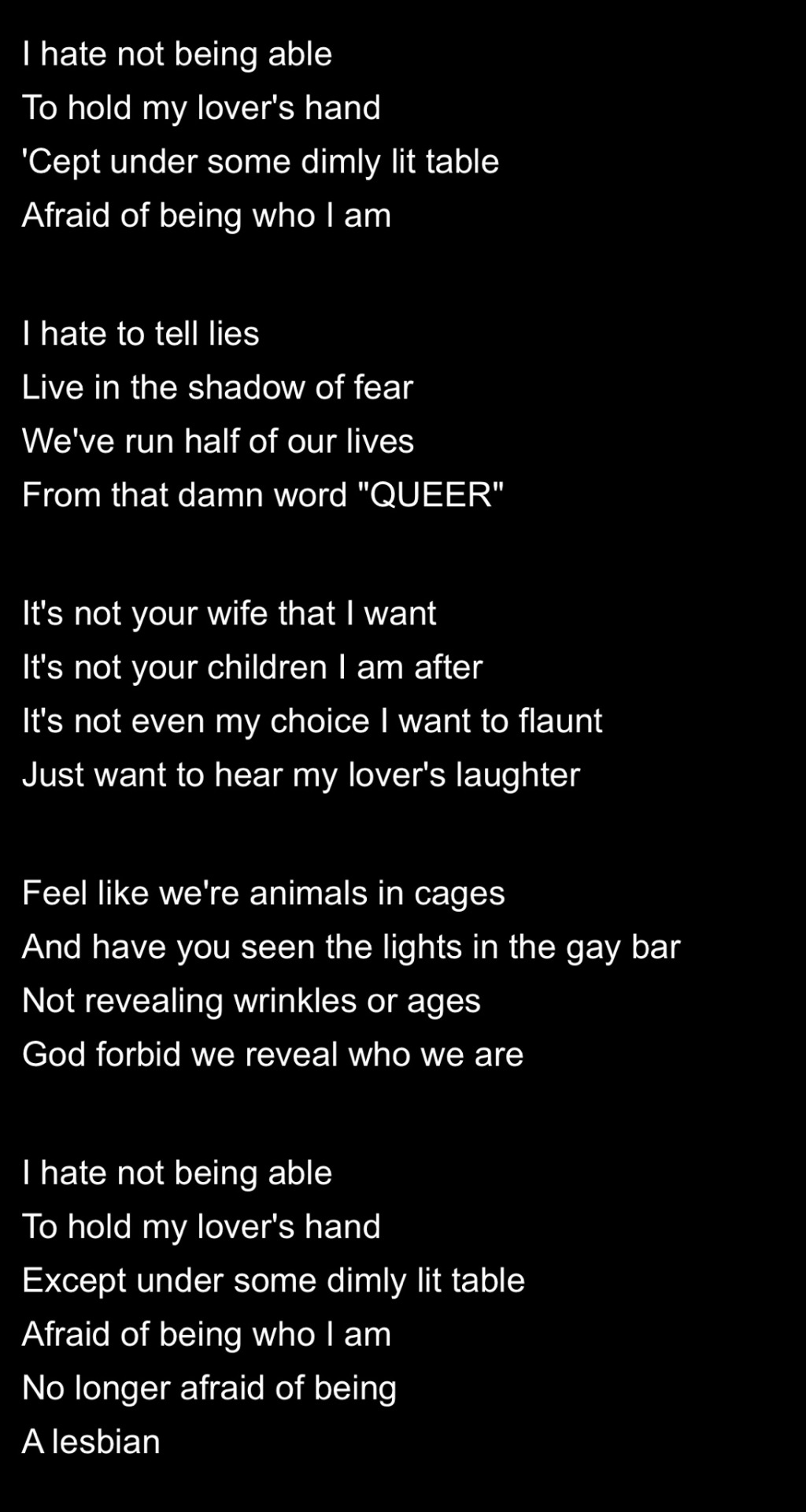
“Angry Atthis” by Maxine Feldman, 1969.
22 notes
·
View notes